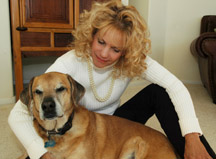This can include running back and forth as if he were playing tag with mom or dad as the "post," a greater need for physical attention, or some regression to earlier behavior, e.g., a need to be held. Parents who misread this signal will misunderstand the motivation and respond with dismissal ("Stop that, you're a big boy, now!"), irritation or impatience and unavailability. This can lead to a great deal of disappointment and anxiety in a toddler.
When this sort of short-circuit occurs, it is interpreted immediately as: "UNSAFE." Instead of extinguishing the behavior this leads to a ramping up to try to get the caretaker to understand how badly he or she is needed.
According to Mahler, continued disruptions in this critical phase can result in a failure to develop a secure sense of self and a protracted feeling of unease, anxiety, and dependency.
How do children deal with fear? The same way we do. Instantly and vigorously.
All of us were children once. Some of us remember it better than others. I remember vividly one recurring nightmare I had when I was still a toddler (toy soldiers with bayonets walking slowly and menacingly towards me). Every time I had it, I would open my eyes and try to scream, but I could not move and no sound came out of my mouth. That was one response. The other was when I finally was able to move and I ran into my parents' room, crying.
And they did precisely what I needed. They let me stay with them till I was calmed and then led me back to my own bed and helped me chase away the "bad guys.'
Magic Words, Verbal First Aid and Mirror Neurons
Empathy is the key at every level. It is not the same as pity or sympathy. It is the ability to recognize what someone else is feeling even if we ourselves are not feeling it at that moment, even if we don't understand why he is feeling it, and even if we don't like it very much.
It is not easy, but it is perhaps the most vitally important and potentially rewarding skill a parent can have.
Scientists have recently discovered a type of neuron that fires not only when it is performing an action, but also when we are watching someone else perform that same action (PBS, 2005). For this neuron, seeing an action is the same as doing it yourself--thus, they are called "Mirror Neurons."
A fundamentally similar experiment was done (reported in The Worst is Over, 2002) with individuals watching a chase scene in a movie. With electrodes attached to them at critical junctures, they found that watching the movie produced involuntary muscle responses similar to those they would have had had they actually been in the movie scene.
In his article (Scientific American Mind, May/June 2006) "A Revealing Reflection," David Dobbs talks about his first mirroring experience with his son.
"Sometime just before my second child was born , I read that if you stuck your tongue out at a newborn, he'd do the same. So in young Nicholas's first hour, even as my wife was still in the O.R. getting stitched up (40-hour labor, C-section, epic saga), I tried it. Holding the gooing, alert young lad before me in my hands -- he was no bigger than a ball of pizza dough -- I stuck my tongue out at him. He immediately returned the gesture. I hadn't slept in 40 hours. I laughed till I cried. "
These mirror neurons typically fire in the premotor
cortex of the brain, that segment responsible for the development of language,
empathy, and, believe it or not, pain.
In the theory underpinning Verbal First Aid, what is even more amazing and
potentially life-saving is that you don't even have to watch an action to fire
along with it. You can hear about it. The words generate the imagery, which in
turn generate the biochemistry that mirrors the experience.
Mirror neurons are only the latest scientific reduction of a process we have all known intuitively since the first laugh broke up a whole room, since the first tear prompted sorrow in a friend, since the first delight in watching the underdog win.
As Dobbs explains, --it suggest a common neurobiologic dynamic for our understanding of others"it makes sense of why yawns are contagious"why we feel Hamlet's grief for Ophelia."




